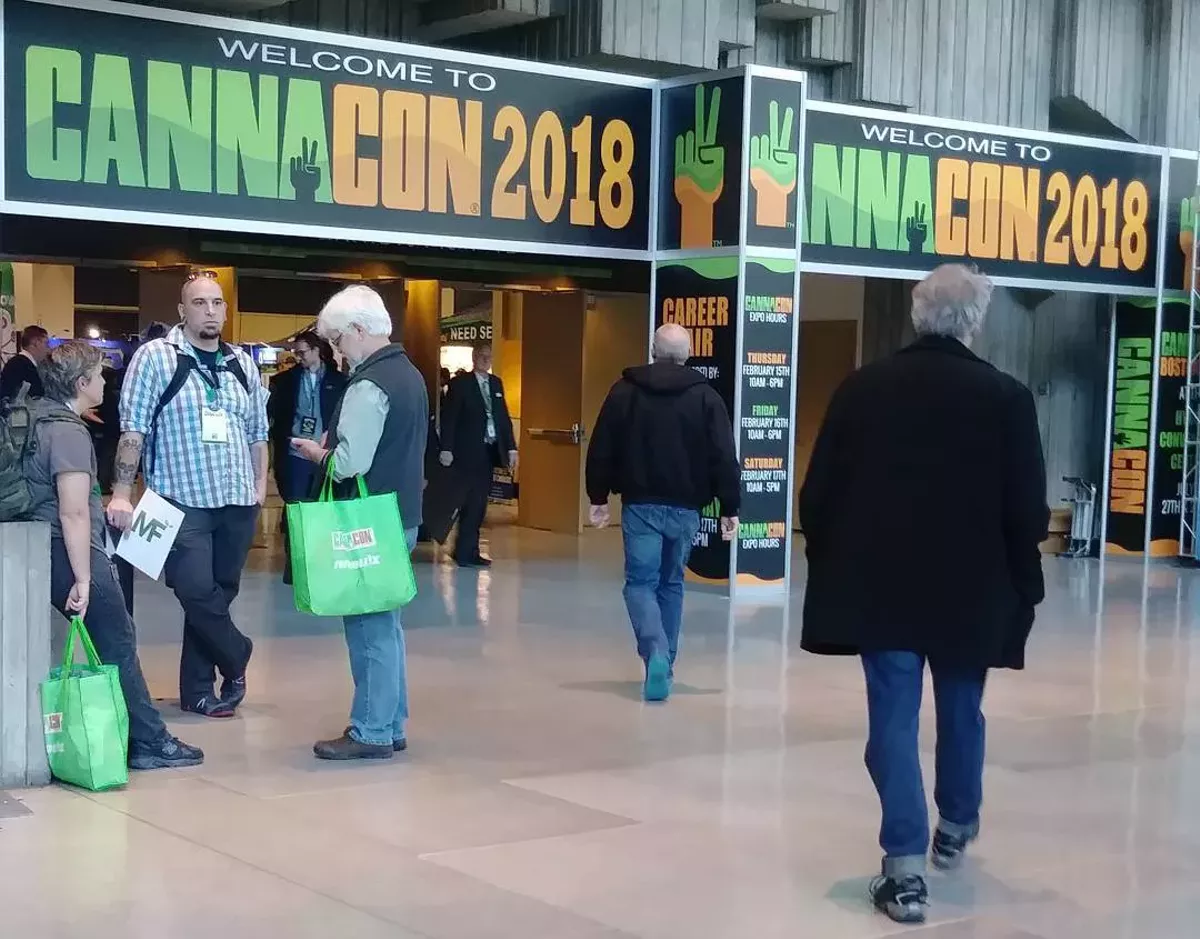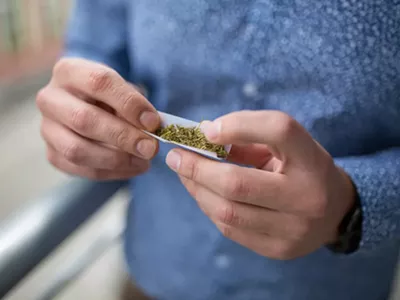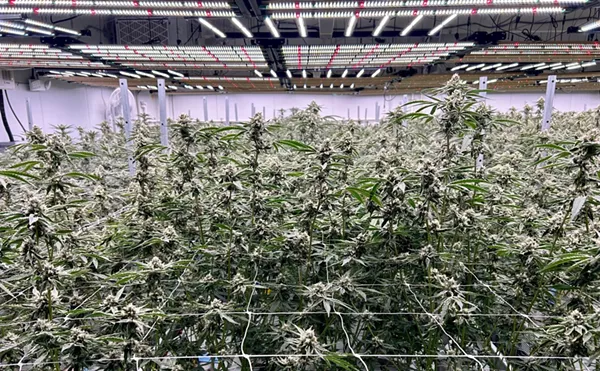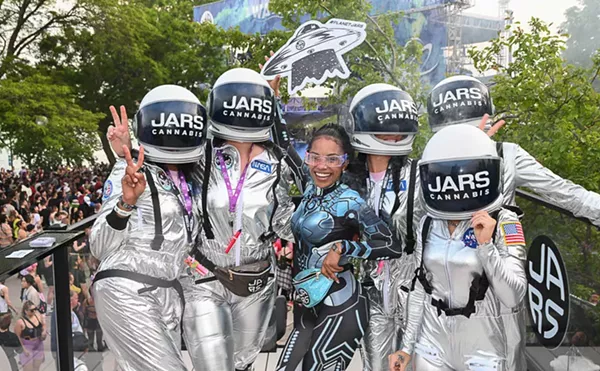

Audio By Carbonatix
[
{
"name": "GPT - Leaderboard - Inline - Content",
"component": "35519556",
"insertPoint": "5th",
"startingPoint": "3",
"requiredCountToDisplay": "3",
"maxInsertions": 100,
"adList": [
{
"adPreset": "LeaderboardInline"
}
]
}
]
There seem to be two major influences on the legal marijuana industry development. One track is the business end, with folks who want to get into the business — or already are — blowing full steam ahead where they can and chomping at the bit where they can't. The other track is at all levels of government, which is being reluctantly dragged along in accommodating the will of the people and business interests.
A prominent example of how things are moving on the business track is the June 1-2 CannaCon scheduled for Cobo Center. CannaCon is the biggest marijuana business-to-business trade show in the nation. It started in Seattle in 2014, added Boston soon after, and has now spread to Detroit.
"It's a business-to-business trade show, like a home and garden show," says Angela Grelle, CannaCon's director of marketing. "We cater to businesses in the cannabis space."
That space is getting bigger and bigger all the time. Grelle reports that the response for participants was so strong CannaCon added more exhibit booths. As of this writing there are 205 vendors, with a waiting list of several more.
And these aren't people who want to grow marijuana and sell it in dispensaries. We're talking about the people who provide services to those people — like insurance companies, legal services, lights, extraction machines, fertilizers, barcode scanners, inventory tracking, and communications, to name several.
Scheduled speakers will address things like marketing, retailer loyalty programs, technology, taxes, and accounting — all the things that apply to almost any business.
"The industry is really continuing to grow," says Grelle. "As the industry grows, we have all these new companies. The industry is changing. It's becoming more professional as a whole. Peace signs and tie-dye are starting to fade away. As a rule, businesses are getting more professional as the industry goes more mainstream. There are businesses outside of the cannabis space who are realizing there is space for them." Grelle says Sprint is even going to have a large visitors booth at the conference.
This is an industry in which talking about your business on the phone was once something you never did. Now the phone company is angling for the business that cannabis companies can bring them. All of this is what some folks who have long been in the cannabis space are uneasy with, but it doesn't seem like the momentum is going to stop.
Which brings us to state and local governments, which have been trying their best to stop the momentum since forever. For example, state Attorney General Bill Schuette — now a GOP candidate for governor — did everything in his power and more to derail the 2008 Michigan Medical Marihuana Act while a judge on the state court of appeals. When he became attorney general in 2011 he corralled county prosecutors and law enforcement to train them on how to resist marijuana businesses.
The state legislature behaved just as badly, taking until 2016 to pass laws allowing and regulating commercial production and sales of medical cannabis. Now, a decade after the MMMA was passed, the state is still fumbling around as it attempts to process licensing for businesses — with a state-imposed June 15 deadline looming that would force unlicensed businesses to shut down. Only a handful of licenses have been handed out for the entire state, and none in Detroit.
Part of the problem is that the licensing process is so convoluted and onerous it puts an undue burden on those applying and those who have to process the applications. State regulators are combing through applicants' financial records, possible criminal backgrounds, and social media accounts. The medical marijuana licensing board began taking applications on Jan. 15. In early May, two weeks after the April 15 date to begin handing out licenses, the director of the Bureau of Medical Marijuana Regulation said officials hope to hand out the first licenses within six weeks. The way it looks right now, most folks already doing business in Michigan will have to shut down unless the licensing board changes its tune.
A lot of current businesses will have to shut down anyway because they're probably not going to get licenses.
In Detroit, the city stopped taking applications for "caregiver centers" in early January, effectively capping the number of dispensaries at the reported 62 it has already granted licenses to. That doesn't mean any of them will get state licenses. In addition, Detroit doesn't seem inclined to license facilities for growing, processing, testing, or transporting cannabis.
When it came to a 2016 initiative to legalize recreational marijuana, the legislature passed a law that disqualified some of the signatures gathered because of a timing issue. This year's initiative cleared all bars and should be on the fall ballot, although reports out of Lansing indicate legislators may be hatching a plan to pass the law and then change it. If the law were to pass in the November election it would take a three-quarters majority of the legislature to change it. If the legislature passes it, changes could be made with a simple majority.
Despite all of the official opposition, Grelle says that CannaCon is coming to Detroit because legalization is looming. Even the obstinate legislature isn't talking about stopping recreational legalization, just "improving" it.
Another example of the way things have changed is that in 2008 Schuette led the opposition to the MMMA and rode that horse to the state attorney general office in the 2010 election. Today he says that while he is opposed to the legalization... well, uh, you know, the will of the people and all.
Contrast that with Democratic state attorney general candidate, Dana Nessell, who is actually speaking at CannaCon (Gov. Snyder was contacted but didn't call back) and running a pro-cannabis campaign. Marijuana activists were part of the coalition that garnered the nomination for her.
"I think the market is opening up and it's going to be a good industry in Michigan in general," says Grelle. "We're very excited. We're hopeful that this is going to become an annual event. We're more excited than we have been with any other show in a while."
That's probably the case when someone is breaking into a new market. This isn't the Hash Bash where speakers talk about changing the law and attendees flout it by smoking marijuana. CannaCon is about marijuana, but it's more about staying inside the legal lines, and there will be no sanctioned smoke wafting through the air at Cobo Center.
CannaCon will be held from 10 a.m.-6 p.m. on Friday, June 1 and 10 a.m.-5 p.m. on Saturday, June 2 at Cobo Center, 1 Washington Blvd., Detroit; 313-877-8777; cannacon.org; Tickets start at $70 for one-day passes and start at $120 for two-day passes.
Connection will host the CannaCon Detroit Networking Mixer from 6 p.m.-10 p.m. at Saint Andrew's Hall, 431 E. Congress St, Detroit; 313-961-8961; saintandrewsdetroit.com; Tickets are $55 standard, $100 VIP.
Stay on top of Detroit news and views. Sign up for our weekly issue newsletter delivered each Wednesday.






